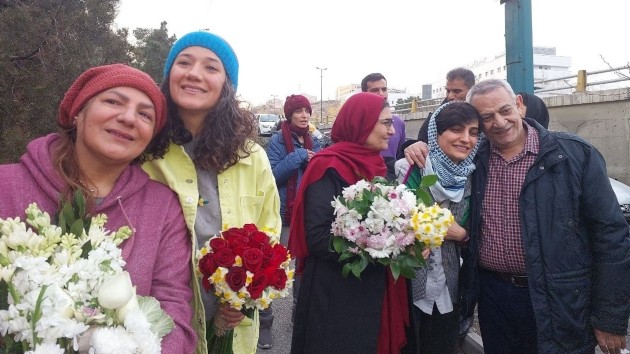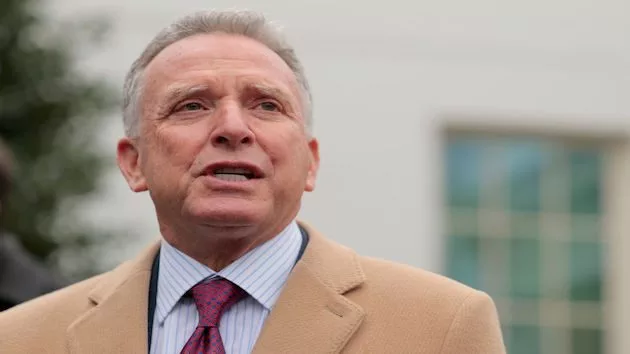(LONDON) — Two Iranian journalists who were jailed on charges related to the bloody nationwide protests in 2022 were temporarily released on bail Sunday after about 16 months of imprisonment. But in less than 24 hours, the Iranian judiciary announced it had opened a new case against them for posing without a hijab upon their release.
A new judicial case has been opened against Niloofar Hamedi and Elaheh Mohammadi for not covering their hair right after leaving prison while they were hugging their loved ones, who were waiting for them outside, according to Mizan, the Islamic Republic judiciary’s official news agency.
“Both journalists are banned from leaving the country,” Mizan reported, adding they are temporarily released from prison on $200,000 bail each.
Photos of the two journalists after their release spread across Iranian social media and showed them being hugged and welcomed by their family and friends, who had been waiting for them outside Iran’s notorious Evin prison.
“It was light and hope and happiness, all over,” Jina, one of Hamedi and Mohammadi’s friends who was waiting for them outside the prison, told ABC News on Monday. Jina asked not to use her real name for security concerns.
Hamedi, 31, and Mohammadi, 36, were the first journalists to cover the news of Mahsa Amini’s death in police custody in September 2022 and her funeral the following month. Amini’s death sparked months of protests across Iran that later became known as the “Woman, Life, Freedom” movement.
Amini, 22, was on a trip to Tehran in September 2022 when the hijab police, called the “morality police,” arrested her for not wearing an outfit that fully matched the Sharia-based compulsory hijab laws of the country. She was taken into custody only to be announced dead at a hospital three days later, according to the Islamic Republic News Agency. Iran Human Rights reported in April 2023 that at least 537 people had been killed since the start of the protests and, according to the state-run IRNA, at least 22,000 people were arrested.
The Islamic Republic’s judiciary sentenced Mohammadi and Hamedi to 12 and 13 years in prison, respectively, in October 2023. Hamedi faced a list of charges, including “collaborating with the hostile government of the United States” and “conspiring to commit crimes against national security and propagandistic activity against the system,” Masoud Setayeshi, judiciary spokesperson, previously said. Mohammadi faced the same accusations as Hamedi for covering Amini’s funeral in Saqez, in northwestern Iran.
While months have passed since active street protests, journalists, activists and former prisoners who were jailed for participating in the protests are still under security threats from the regime.
Describing the situation outside the prison while waiting for the release of the two journalists, Jina said there was still “a security vibe” that left everyone in despair and stress, especially the two journalists’ families.
Jina said she was happy to see her friends and described how sad she became after seeing Hamedi and Mohammadi’s faces.
“Niloofar had grown so much gray hair and Elah’s face was drained. You could see the traces of hardship and suffering in their eyes,” she said.
Talking about how a new case was opened against her friends less than a day after their temporary release, Jina said she was not surprised.
“It was predictable for me. I even know if our friends would spend all the years of their sentences in prison, still the government does not allow them to have a comfortable life in Iran,” she said.
Referring to waves of immigration out of the country because of the direct and indirect security pressures, Jina said the regime might “keep annoying them so much and disturb their families until they are forced to emigrate and leave the country, which is the worst part for me, as it leaves Iran empty of real humane experts in different fields.”
Despite the odds and struggles, and even if the release of the two journalists is temporary and was followed by a new case, it has already become “a new blood into the veins of hope,” an Iranian activist who asked not to be named told ABC News.
Among many activists who congratulated Mohammadi and Hamedi and their families on Sunday was Amini’s father, who posted a note on his Instagram page signed with “love and devotion.”
“The news of your release after 400 days of imprisonment and being away from your family made us all happy and was sweet in taste. I sincerely congratulate you and your courageous and patient families on this precious freedom,” Amjad Amini wrote.
Copyright © 2024, ABC Audio. All rights reserved.






